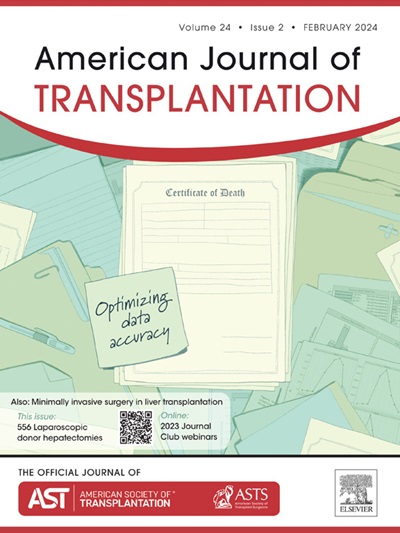不应拒绝主动吸烟者进行肺移植。
IF 8.2
2区 医学
Q1 SURGERY
引用次数: 0
摘要
国际社会共识声明、健康保险政策和个人移植项目几乎一致认为吸烟是肺移植的绝对禁忌症。这种否认通常是基于功利主义的理由——活跃的吸烟者由于预期的长期生存能力差而具有令人望而却步的高风险——或者是非功利主义的理由——与吸烟者资源分配的公平性有关。然而,现有的关于肺移植受者在移植后恢复吸烟的文献并没有显示死亡率增加。同时,移植后短期和长期死亡率较高的其他情况,如再移植,被认为是相对禁忌症。我还认为,关于责任和公平的争论并不支持将积极吸烟者排除在外。由于其他持续吸入暴露而患有肺病的患者,包括慢性超敏性肺炎中的禽抗原,并不自动排除移植。我认为,主动吸烟者被污名化,导致吸烟被视为不遵守规定的不恰当代表。我建议肺移植社区应该将吸烟视为移植的相对禁忌症,而不是绝对禁忌症。移植计划政策应修订,以改善主动吸烟者的获取途径,特别是那些迫切需要移植且无法存活足够长时间以证明戒烟的人。本文章由计算机程序翻译,如有差异,请以英文原文为准。
Active smokers should not be denied access to lung transplantation
International society consensus statements, health insurance policies, and individual transplant programs almost uniformly consider active cigarette smoking an absolute contraindication to lung transplant. This denial is typically supported on utilitarian grounds—active smokers are prohibitively high-risk because of anticipated poor long-term survival—or nonutilitarian grounds related to fairness in resource allocation to smokers. However, the available literature on lung transplant recipients who resume smoking posttransplant does not demonstrate increased mortality. At the same time, other conditions that carry significant short and long-term posttransplant mortality, such as retransplantation, are considered relative contraindications. I also suggest that arguments regarding responsibility and fairness do not support the exclusion of active smokers. Patients with lung disease from other ongoing inhalational exposures, including avian antigens in chronic hypersensitivity pneumonitis, are not automatically excluded from transplant. I argue that active smokers are stigmatized, leading smoking to be treated as an inappropriate proxy for nonadherence. I suggest that the lung transplant community should treat active smoking as a relative, not absolute, contraindication to transplant. Transplant program policy should be revised to improve access for active smokers, particularly those who are in urgent need of a transplant and who will not survive long enough to demonstrate smoking abstinence.
求助全文
通过发布文献求助,成功后即可免费获取论文全文。
去求助
来源期刊
CiteScore
18.70
自引率
4.50%
发文量
346
审稿时长
26 days
期刊介绍:
The American Journal of Transplantation is a leading journal in the field of transplantation. It serves as a forum for debate and reassessment, an agent of change, and a major platform for promoting understanding, improving results, and advancing science. Published monthly, it provides an essential resource for researchers and clinicians worldwide.
The journal publishes original articles, case reports, invited reviews, letters to the editor, critical reviews, news features, consensus documents, and guidelines over 12 issues a year. It covers all major subject areas in transplantation, including thoracic (heart, lung), abdominal (kidney, liver, pancreas, islets), tissue and stem cell transplantation, organ and tissue donation and preservation, tissue injury, repair, inflammation, and aging, histocompatibility, drugs and pharmacology, graft survival, and prevention of graft dysfunction and failure. It also explores ethical and social issues in the field.

 求助内容:
求助内容: 应助结果提醒方式:
应助结果提醒方式:


